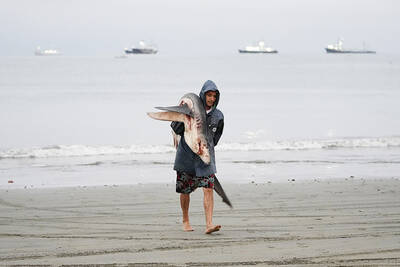Google cofounder Larry Page was allowed into New Zealand, despite its closed border, so his son could receive urgent medical attention, the government confirmed yesterday.
The billionaire’s visit had prompted criticism from New Zealand Prime Minister Jacinda Ardern’s political opponents, who demanded an explanation for why he was permitted to enter despite COVID-19 travel restrictions.
New Zealand Minister of Immigration Kris Faafoi told reporters that Page, who is reportedly worth US$121 billion, had applied for a medical exemption “to make sure his son got the treatment that was required.”
New Zealand Minister of Health Andrew Little said in parliament that an application was approved in January for a child, accompanied by an adult, to be medically evacuated from Fiji.
He said that anyone accepted for treatment in New Zealand is considered to be in immediate need of care and cannot be treated in their current location.
Immigration New Zealand general manager of border and visa operations Nicola Hogg said that Page “met relevant requirements” to be approved entry.
Hogg did not address the question of whether Page spent two weeks in quarantine, as required of people entering New Zealand.
New Zealand’s opposition ACT Party called on Ardern’s government to be more open about his visit.
“The government has questions to answer about why billionaire Google cofounder Larry Page was allowed into New Zealand when desperate Kiwis and separated families can’t get through the border,” ACT leader David Seymour said.
Seymour said that while he had sympathy for Page’s situation, there were numerous people with similar issues who could not get through the border, while some New Zealanders were stranded overseas.

WAKE-UP CALL: Firms in the private sector were not taking basic precautions, despite the cyberthreats from China and Russia, a US cybersecurity official said A ninth US telecom firm has been confirmed to have been hacked as part of a sprawling Chinese espionage campaign that gave officials in Beijing access to private texts and telephone conversations of an unknown number of Americans, a top White House official said on Friday. Officials from the administration of US President Joe Biden this month said that at least eight telecommunications companies, as well as dozens of nations, had been affected by the Chinese hacking blitz known as Salt Typhoon. US Deputy National Security Adviser for Cyber and Emerging Technologies Anne Neuberger on Friday told reporters that a ninth victim

Russia and Ukraine have exchanged prisoners of war in the latest such swap that saw the release of hundreds of captives and was brokered with the help of the United Arab Emirates (UAE), officials said on Monday. Ukrainian President Volodymyr Zelenskiy said that 189 Ukrainian prisoners, including military personnel, border guards and national guards — along with two civilians — were freed. He thanked the UAE for helping negotiate the exchange. The Russian Ministry of Defense said that 150 Russian troops were freed from captivity as part of the exchange in which each side released 150 people. The reason for the discrepancy in numbers

A shark attack off Egypt’s Red Sea coast killed a tourist and injured another, authorities said on Sunday, with an Italian Ministry of Foreign Affairs source identifying both as Italian nationals. “Two foreigners were attacked by a shark in the northern Marsa Alam area, which led to the injury of one and the death of the other,” the Egyptian Ministry of Environment said in a statement. A source at the Italian foreign ministry said that the man killed was a 48-year-old resident of Rome. The injured man was 69 years old. They were both taken to hospital in Port Ghalib, about 50km north

MISSING: Prosecutors urged the company to move workers out of poor living conditions to hotels, but residents said many workers had already left the town Brazil has stopped issuing temporary work visas for BYD, the Brazilian Ministry of Foreign Affairs said on Friday, in the wake of accusations that some workers at a site owned by the Chinese electric vehicle producer had been victims of human trafficking. The announcement came days after labor authorities said they found 163 Chinese workers who had been brought to Brazil irregularly in “slavery-like” conditions at the BYD factory construction site in the northeastern state of Bahia. The workers were employed by contractor Jinjiang Group, which has denied any wrongdoing. Later, the authorities also said the workers were victims of human trafficking,